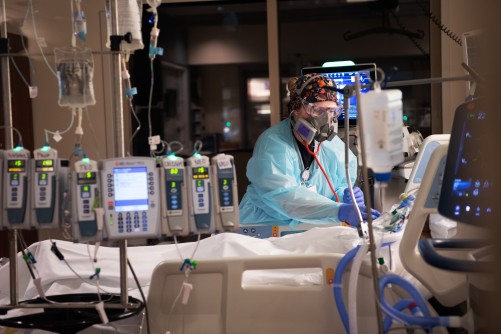A new Northwestern Medicine study published in GeroScience sought to determine the prevalence, risk factors and significance of persistent viral shedding in hospitalized COVID-19 patients. The Northwestern Medicine Neuro COVID-19 research team discovered patients who continued to test positive more than 14 days after their initial positive test were more likely to experience delirium, longer hospital stays, were less likely to be discharged home, and had a greater six-month mortality than those without persistent viral shedding of COVID-19.
The study included all patients who required hospitalization for COVID-19 throughout the Northwestern Medicine health system between March and August 2020. Of the 2,518 patients hospitalized during that time, 959 underwent repeat COVID-19 testing at least 14 days from initial testing, and 405 of those patients (42%) were found to have persistent viral shedding.
In the persistent shedding group:
- 54% of patients were men
- 56% experienced in-hospital delirium, the primary neurologic complication of acute COVID-19
- Less likely to be discharged to home from the hospital
- 15% of patients died within six months
- Common comorbidities were diabetes, chronic kidney disease, hypertension and increased BMI
“This study is one of the first to inform the care of patients who continue to test positive for COVID-19,” said Ayush Batra, MD, a Northwestern Medicine neurocritical care specialist who treats COVID-19 patients and co-authored the study. “We were intrigued to see the strong and large association between persistent viral shedding and long-term post-hospital mortality, even after adjusting for age, severity of respiratory dysfunction, and presence of delirium. This suggests that the presence of persistently positive RT-PCR tests has important clinical implications for patients.”
“These patients were much more likely to have been delirious while they were hospitalized, even after adjusting for other factors that put patients at risk for delirium. This is an important finding because many studies, even pre-dating the COVID-19 pandemic, suggest that patients who are delirious during hospitalization are more likely to have long-term cognitive issues and may experience accelerated cognitive decline with aging. As such, patients with persistent viral shedding may warrant closer surveillance and monitoring for development of complications following COVID-19,” said Eric Liotta, MD, a Northwestern Medicine neurocritical care specialist who treats COVID-19 patients and co-authored the study.
The strong link between prolonged viral shedding and experiencing delirium also suggests studies are needed to investigate if prolonged viral shedding is related to neurological symptoms in COVID-19 long-haulers. To date, the Northwestern Medicine Neuro COVID-19 Clinic has treated more than 1,400 patients with neurological long-hauler symptoms such as brain fog, fatigue, and loss of taste and smell.
Source: Northwestern Medicine
